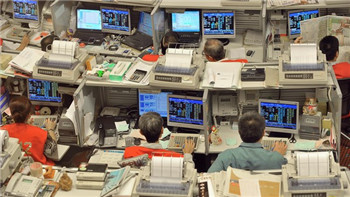(单词翻译:单击)

New year’s events can be anticlimactic. Not so in China where stock markets began 2016 with enough excitement to make traders choke on their bubbles: Shanghai stocks dropped 7 per cent on Monday, Shenzhen more than 8 per cent. It could have been worse. A new mechanism that suspends trading after a drop of 7 per cent halted play early — in this instance, by an hour and a half.
新年可能平淡开场。但在中国不是这样,2016年中国股市的开局相当刺激,交易员们简直要窒息在泡沫中:周一沪市下跌7%,深市跌幅超过了8%。情况本来可能会更糟糕。一项在沪深300指数下跌7%时暂停交易的新机制让这场大戏提早落幕——就这次的情况而言,是提早了一个半小时。
There are no such circuit breakers in Hong Kong where the H-share index of mainland equities fell less than 4 per cent on unremarkable volumes. One might have expected more of a bloodletting. Mainland retail investors participate in both markets — a function both of Stock Connect and a leaky system — and if you can’t sell what you would like, you sell what you can. Foreign H-share investors too might be presumed sellers, having been the most bearish on China’s economy. Yet yesterday, even as Shanghai opened down a further 3 per cent (before rebounding), Hong Kong’s H shares remained resilient.
香港没有这样的熔断机制,由中国内地企业股票组成的H股指数(香港恒生中国企业指数(HSCEI))周一下跌不到4%,成交量也只是寻常。人们原本可能以为会更加惨烈。中国内地的散户投资者既可进入内地股市,也可进入香港股市——通过沪港通(Stock Connect)和一个有漏洞的体系——而且,如果你无法卖出你想卖的,你就卖你能卖的。一直最不看好中国经济的H股境外投资者也可能被认为是卖方。然而,尽管沪市周二开盘进一步下跌3%(之后出现反弹),香港的H股却依然保持坚挺。
The clue may be in the price: the H-share index is cheap. On seven times 2016 earnings, it trades at a lower multiple than Spain (with 22 per cent unemployment), Brazil (dependent upon commodities and thus China), and both Turkey and Egypt, affected by Middle Eastern turmoil.
线索可能隐藏在价格之中:H股很便宜。H股指数市盈率为7倍,低于西班牙(该国失业率达到22%)、巴西(该国依赖大宗商品,因而也依赖中国)以及受中东乱局影响的土耳其和埃及。
Shanghai, by comparison, trades on 12.6 times earnings. This reflects a wide (37 per cent) spread between the Shanghai’s A shares and the H-share equivalents. Before the ups and downs of 2015 it was more usually below 20 per cent, hinting at significant upside to the H-share index. True, it does not represent the best of China’s “new economy”, being heavily skewed towards banks in particular. Growth forecasts are moribund. Yet with expectations already so dire, it is hard to see how they can worsen. Even property — beset with overcapacity — has been pulling out of its slump.
相比之下,沪股市盈率为12.6倍。这反映出A股和H股的巨大价差(37%)。在经历2015年的跌宕起伏之前,二者价差更多时候处于20%以下——暗示H股指数大有上行空间。诚然,H股指数并不代表中国“新经济”中最好的部分,特别是银行股占比偏大。增长预测十分惨淡。然而,在预期已经如此糟糕的情况下,很难想象还能坏得哪里去。即使是受产能过剩困扰的地产业也在逐渐走出低迷。
Price is not everything, it is true. But even the bears would agree: everything has a price.
的确,价格不是一切。但即使是看空者也同意:一切都有价格。


